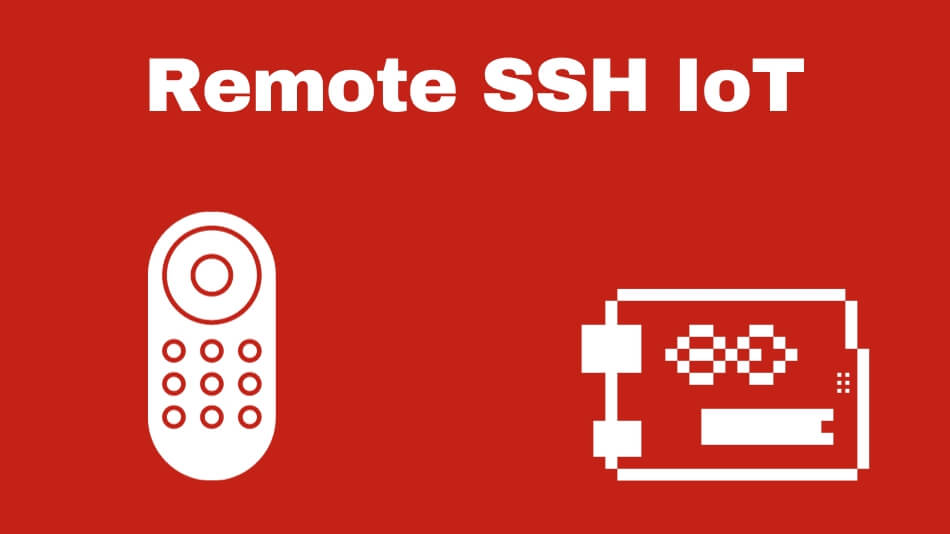Best SSH Remote IoT Device: Your Ultimate Guide To Secure Connectivity
When it comes to securing your IoT devices, having the best SSH remote IoT device is crucial. In today’s hyper-connected world, IoT devices are everywhere—from smart homes to industrial setups. But how do you ensure your devices remain secure while maintaining seamless remote access? Let’s dive into the nitty-gritty of what makes an SSH remote IoT device the perfect companion for your tech needs.
Picture this: you're sitting on a beach sipping a cold drink, but you suddenly need to check if your home security system is still running smoothly. With the right SSH remote IoT device, you can log in from anywhere in the world and verify everything's under control. It's like having a digital Swiss Army knife for your tech arsenal.
But choosing the best SSH remote IoT device isn't as easy as it sounds. There are a ton of options out there, each claiming to be the ultimate solution. So, how do you pick the right one? Stick around, because we’re about to break it down for you step by step, with some pro tips and tricks to make your decision a whole lot easier.
- Alice Rosenblum Leak Pics The Untold Story You Need To Know
- Kayson Myler Age Unveiling The Rising Starrsquos Journey
Why SSH Matters in IoT Devices
SSH, or Secure Shell, is like the superhero of secure communication. It encrypts your data and keeps prying eyes away from sensitive information. In the realm of IoT, where security breaches can lead to major headaches, having SSH-enabled devices is a no-brainer. But why exactly does SSH matter so much?
First off, SSH ensures that your commands and data transfers between devices are encrypted. This means hackers can't just waltz in and steal your info. Plus, it authenticates both the server and the client, adding another layer of protection. With SSH, you’re not just protecting your devices—you’re safeguarding your entire network.
How SSH Protects Your IoT Ecosystem
- Encryption: SSH encrypts all data transmitted between devices, making it nearly impossible for unauthorized users to intercept.
- Authentication: It verifies the identity of both the client and server, ensuring only authorized parties can access the system.
- Command Execution: SSH allows you to securely execute commands on remote devices without worrying about data exposure.
Imagine trying to manage dozens of IoT devices without SSH. It'd be like leaving your front door wide open with a big sign that says, "Hack me!" But with SSH, you’re basically installing a state-of-the-art security system that keeps your digital home safe and sound.
- Alicia Rosenblum Lealed The Rising Star You Need To Know
- Alicia Rosenblum Lekas The Rising Star Whorsquos Turning Heads In Hollywood
Top Features to Look for in the Best SSH Remote IoT Device
Not all SSH remote IoT devices are created equal. To find the best one for your needs, you’ll want to look for specific features that set them apart. Here’s what you should keep an eye out for:
1. Security Protocols
Security should always be your top priority. Look for devices that support the latest SSH protocols, such as SSH-2. These protocols provide stronger encryption and better authentication mechanisms, ensuring your data stays safe from cyber threats.
2. Scalability
As your IoT ecosystem grows, you’ll need a device that can scale with you. Whether you’re managing a handful of smart home gadgets or an entire industrial network, your SSH remote IoT device should be able to handle the load without breaking a sweat.
3. Compatibility
Make sure the device you choose is compatible with your existing systems. Whether you’re using Linux, Windows, or macOS, your SSH remote IoT device should integrate seamlessly with your setup.
Top 10 Best SSH Remote IoT Devices
Now that you know what to look for, let’s take a look at some of the top SSH remote IoT devices on the market. These devices have been tested and reviewed by experts, so you can trust that they’ll deliver the performance and security you need.
1. Raspberry Pi 4
The Raspberry Pi 4 is a fan favorite in the IoT world. With its powerful processor and support for SSH, it’s perfect for remote management tasks. Plus, it’s incredibly versatile, allowing you to run a wide range of applications.
2. BeagleBone Black
For those who need a bit more horsepower, the BeagleBone Black is a great option. It offers robust performance and is well-suited for industrial applications. Its SSH capabilities are top-notch, making it a reliable choice for remote access.
3. Intel NUC
The Intel NUC is a compact powerhouse that’s perfect for more demanding IoT setups. With its advanced security features and seamless SSH integration, it’s a great choice for professionals who need reliable remote access.
4. ASUS Tinker Board
The ASUS Tinker Board is another solid option for SSH remote IoT applications. It offers excellent performance and is highly customizable, making it a great choice for DIY enthusiasts.
5. Orange Pi
For budget-conscious users, the Orange Pi is a fantastic option. It provides impressive performance at an affordable price point and supports SSH out of the box.
6. Jetson Nano
If you’re into AI and machine learning, the Jetson Nano is a must-have. It’s designed for high-performance computing and offers robust SSH capabilities, making it ideal for advanced IoT setups.
7. Rock Pi 4
The Rock Pi 4 is a versatile device that’s perfect for both hobbyists and professionals. With its powerful processor and SSH support, it’s a great choice for remote IoT management.
8. Odroid-XU4
The Odroid-XU4 is another top contender in the SSH remote IoT device category. It offers impressive performance and is well-suited for complex IoT applications.
9. Pine64
The Pine64 is a budget-friendly option that doesn’t skimp on features. It supports SSH and is highly customizable, making it a great choice for those on a tight budget.
10. Particle Argon
The Particle Argon is designed specifically for IoT applications and offers seamless SSH integration. Its compact size and low power consumption make it perfect for remote deployments.
How to Set Up SSH on Your IoT Device
Setting up SSH on your IoT device might sound intimidating, but it’s actually pretty straightforward. Here’s a quick guide to help you get started:
Step 1: Install SSH
Most IoT devices come with SSH pre-installed, but if yours doesn’t, you’ll need to install it manually. For Linux-based systems, you can usually do this with a simple command:
sudo apt-get install openssh-server
Step 2: Configure SSH
Once SSH is installed, you’ll need to configure it to suit your needs. This includes setting up usernames, passwords, and key-based authentication. Key-based authentication is highly recommended for added security.
Step 3: Test Your Connection
After setting up SSH, test your connection to ensure everything’s working as it should. You can do this by opening a terminal and typing:
ssh username@ip_address
If everything’s set up correctly, you should be able to log in without any issues.
Common Challenges and How to Overcome Them
While SSH remote IoT devices offer incredible benefits, there are some challenges you might encounter along the way. Here are a few common ones and how to tackle them:
1. Security Threats
One of the biggest challenges with SSH is ensuring your devices remain secure. To mitigate this, always use strong passwords and enable key-based authentication. Additionally, keep your SSH software up to date to protect against vulnerabilities.
2. Network Connectivity
Poor network connectivity can make remote access a nightmare. To overcome this, ensure your devices are connected to a stable network and consider using a static IP address for easier access.
3. Device Management
Managing multiple IoT devices can be overwhelming. To simplify things, consider using a centralized management platform that allows you to control all your devices from a single interface.
Data and Statistics: Why SSH Remote IoT Devices Are a Must-Have
According to recent studies, the global IoT market is expected to reach $1.1 trillion by 2026. With such rapid growth, the demand for secure remote access solutions is higher than ever. Here are a few stats to consider:
- 60% of businesses have experienced an IoT-related security breach.
- SSH is used by over 80% of organizations for secure remote access.
- By 2025, there will be over 75 billion IoT devices connected worldwide.
These numbers highlight the importance of having a reliable SSH remote IoT device in your toolkit. With the right device, you can ensure your network remains secure and your operations run smoothly.
Conclusion: Your Path to Secure IoT Connectivity
Choosing the best SSH remote IoT device is a critical decision that can impact the security and efficiency of your IoT ecosystem. By considering the features we’ve discussed and selecting a device that meets your specific needs, you’ll be well on your way to achieving seamless remote access.
Don’t forget to take action! Whether it’s setting up SSH on your current device or investing in a new one, the key is to stay proactive in securing your IoT setup. Leave a comment below and let us know which SSH remote IoT device you’re using or planning to try. And while you’re at it, why not share this article with your tech-savvy friends? Together, we can build a safer, more connected world.



Detail Author:
- Name : Patience Greenfelder
- Username : chester.zemlak
- Email : maegan38@hintz.info
- Birthdate : 1973-05-07
- Address : 457 Hansen Way Eleazarbury, OK 89759
- Phone : +1-562-669-1868
- Company : Nicolas Ltd
- Job : Tree Trimmer
- Bio : Sed suscipit eos amet vero at eligendi. Aut iusto quisquam distinctio voluptates at et molestias dignissimos. Ut omnis optio eum repudiandae modi animi. Mollitia et quo eos fugit ipsam aut.
Socials
linkedin:
- url : https://linkedin.com/in/rickcrona
- username : rickcrona
- bio : Aut distinctio et enim molestiae.
- followers : 5895
- following : 2772
twitter:
- url : https://twitter.com/rick2002
- username : rick2002
- bio : Quia expedita dicta alias tempora laboriosam excepturi. Commodi veritatis praesentium quis fuga. Possimus autem autem neque laborum laborum.
- followers : 5611
- following : 1797
tiktok:
- url : https://tiktok.com/@rick_official
- username : rick_official
- bio : Vero aliquam officiis quo assumenda maxime. Explicabo unde modi omnis ex nam.
- followers : 4453
- following : 604
instagram:
- url : https://instagram.com/rcrona
- username : rcrona
- bio : Tenetur cumque ab quisquam et nihil eum aut. Et nulla dolor placeat ut aut aut eos.
- followers : 3176
- following : 730